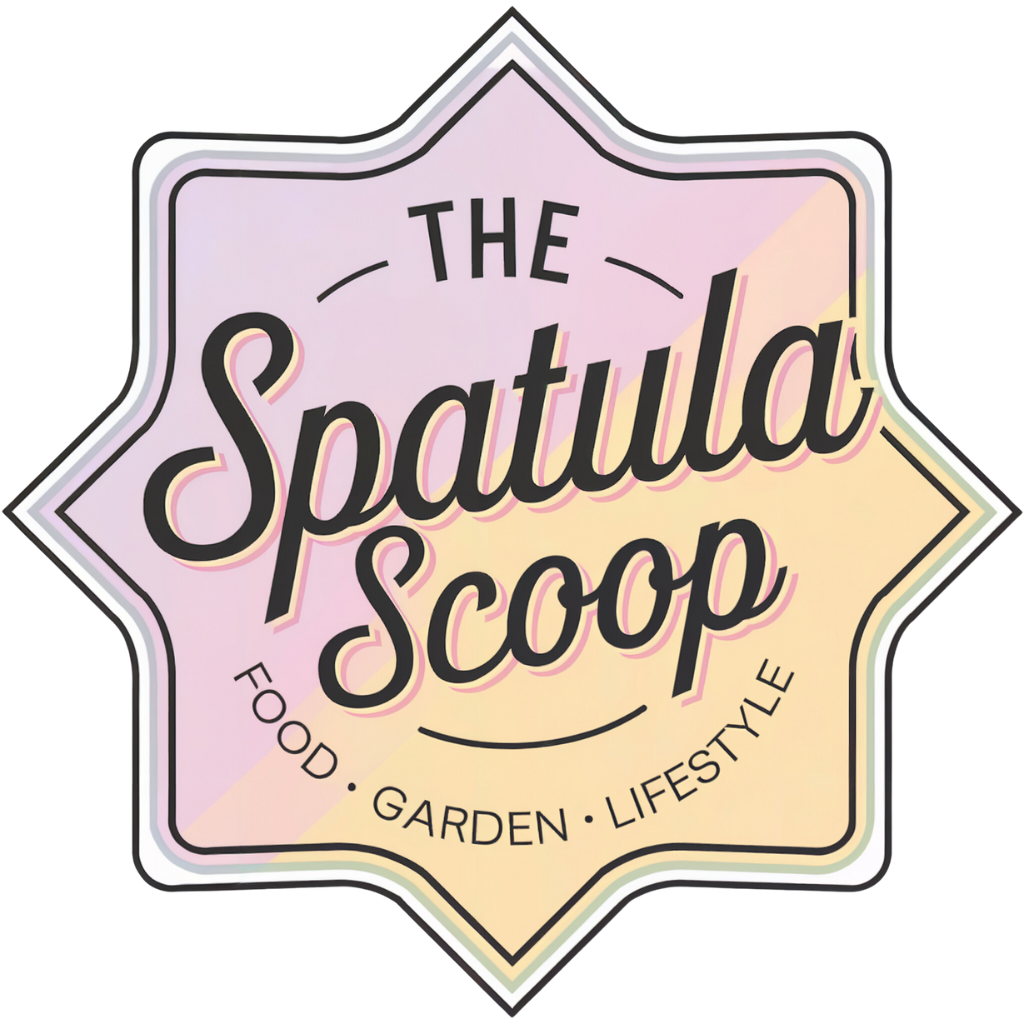How Long Does Apple Juice Last After Opening
Once you've opened your apple juice, its shelf life depends on several key factors, including storage temperature and whether it's pasteurized or fresh-pressed. Pasteurized apple juice typically lasts 7-10 days in the refrigerator when stored properly at or below 40°F (4°C), while fresh-pressed, unpasteurized juice remains good for 3-5 days. You'll want to keep your juice in an airtight container, preferably glass, and store it on middle or back refrigerator shelves to avoid temperature fluctuations from door opening. Watch for signs of spoilage like mold, fizzing, or unusual odors, and don't leave juice at room temperature for more than 2-4 hours. Understanding proper storage methods can greatly extend your juice's freshness.
This post may contain affiliate links. If you make a purchase through these links, I may earn a commission at no additional cost to you. Additionally, portions of this post may be generated using artificial intelligence (AI) technology. While we strive for accuracy, please be aware that AI-generated content may not always be perfect and should be fact-checked when necessary.
The Spatula Scoops
- Pasteurized apple juice stays fresh for 7-10 days in the refrigerator after opening when stored at or below 40°F (4°C).
- Fresh-pressed, unpasteurized apple juice lasts 3-5 days in the refrigerator after opening.
- Store opened apple juice in airtight containers on middle or back refrigerator shelves to maintain freshness.
- Discard juice if you notice mold, fizzing, sour odors, color changes, or bulging containers.
- Opened apple juice should not stay at room temperature for more than 2-4 hours to prevent spoilage.
Storage Temperature Guidelines
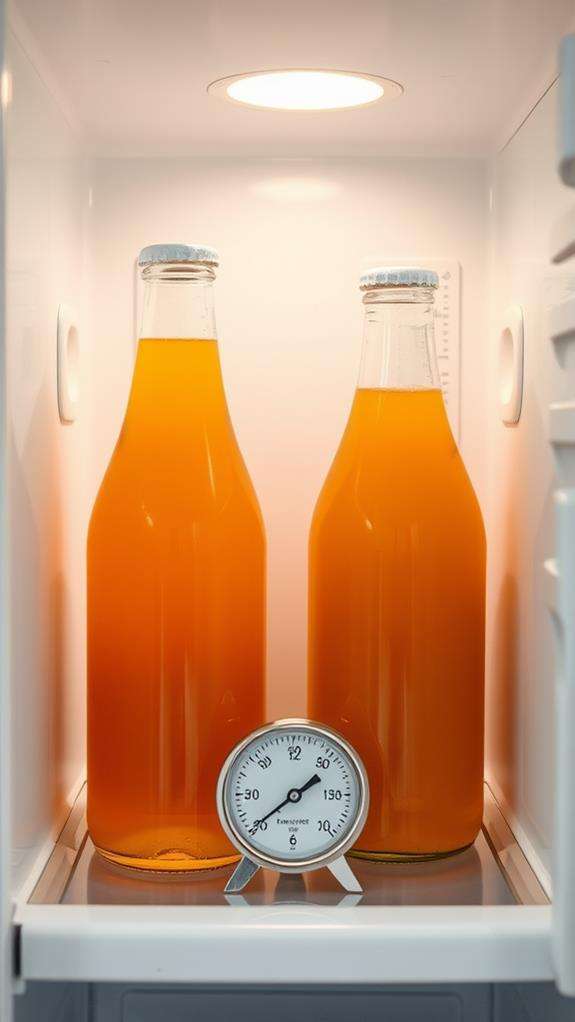
Two key temperature ranges determine how long your opened apple juice will last. When you're storing apple juice in your refrigerator, you'll want to maintain a consistent temperature between 32-40°F (0-4°C), which provides ideal preservation conditions. At this temperature range, your opened apple juice can typically stay fresh for 7-10 days, provided you've kept the container tightly sealed.
Room temperature storage, which falls between 68-72°F (20-22°C), markedly reduces your juice's shelf life to just 2-4 hours. You'll notice that when apple juice sits at room temperature, it becomes a perfect breeding ground for bacteria and other microorganisms that can cause fermentation and spoilage. If you've left your juice out for more than 4 hours, it's best to discard it rather than risk consuming potentially harmful bacteria.
Never store opened apple juice in temperatures above 72°F (22°C), as this accelerates degradation and bacterial growth. You'll also want to avoid storing juice in areas that experience temperature fluctuations, such as near your stove or in direct sunlight, as these variations can compromise the juice's quality and safety.
Signs of Spoiled Juice
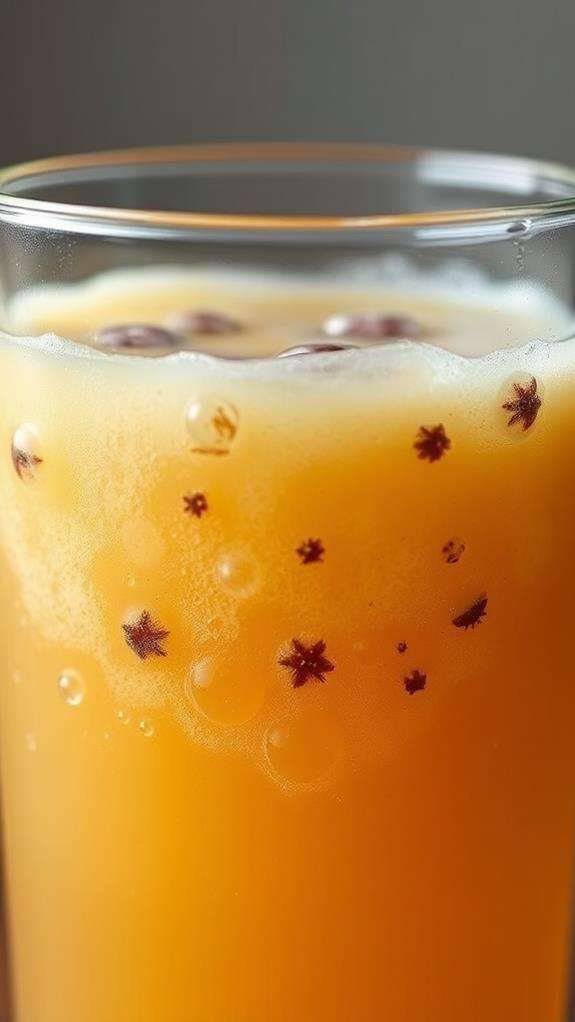
Several unmistakable signs will tell you when your apple juice has spoiled. When you're examining your juice, you'll want to engage multiple senses to determine if it's still safe to consume. Before you take a sip, carefully inspect the juice's appearance, smell, and container condition.
Here are the key indicators that your apple juice has gone bad:
- Visible mold growth, which appears as white, green, or black spots floating on the surface or clinging to the container
- Fermentation bubbles or a fizzy appearance, indicating that natural sugars have begun converting to alcohol
- A sour, vinegar-like smell that's distinctly different from fresh apple juice's sweet aroma
- Changes in color, particularly darkening or clouding that wasn't present when you first opened it
- Container bulging or unusual pressure when opening the cap, suggesting bacterial growth
If you notice any of these signs, it's best to discard the juice immediately. Don't try to salvage questionable juice by removing visible mold or straining it, as harmful bacteria and toxins may be present throughout the liquid even if you can't see them.
Refrigeration Best Practices
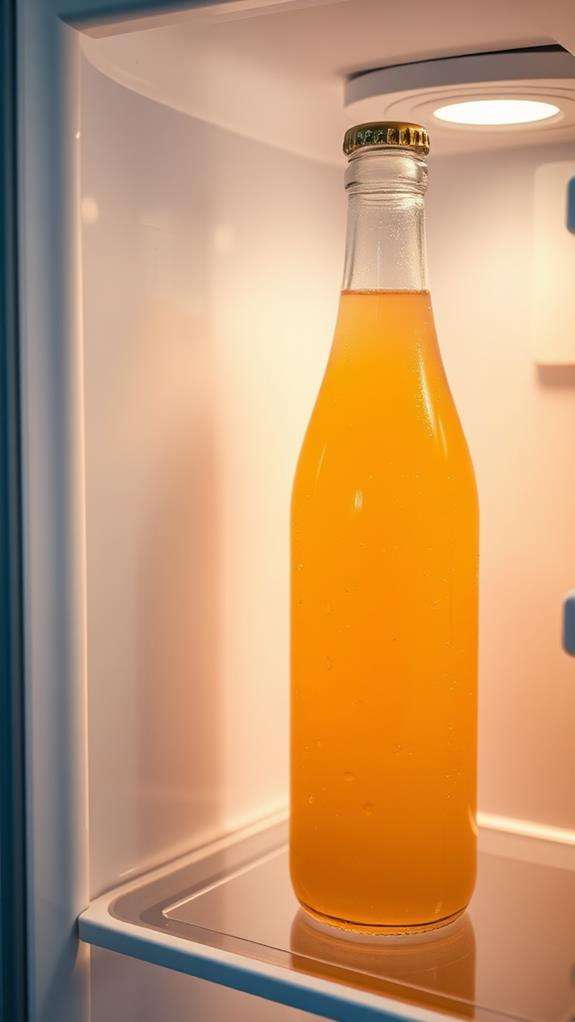
Proper refrigeration stands out as the most critical factor in keeping your opened apple juice fresh and safe to drink. You'll want to maintain your refrigerator's temperature at or below 40°F (4°C), and you should always return the juice to the fridge immediately after pouring. Confirm you're storing the juice in its original container with the cap tightly sealed.
| Storage Location | Temperature Range | Maximum Storage Time |
|---|---|---|
| Door Shelf | 40-45°F | 3-4 days |
| Middle Shelf | 38-40°F | 5-7 days |
| Back of Shelf | 35-38°F | 7-10 days |
| Crisper Drawer | 35-40°F | 5-7 days |
Don't store your opened apple juice in the door compartment, even though it might seem convenient. The temperature fluctuates too much there due to frequent door opening. Instead, place the container on the middle or back shelf where temperatures remain more stable. If you're using a glass container, verify it's properly sealed with an airtight lid, as apple juice can absorb odors from other foods and lose its fresh taste.
Shelf Life After Opening
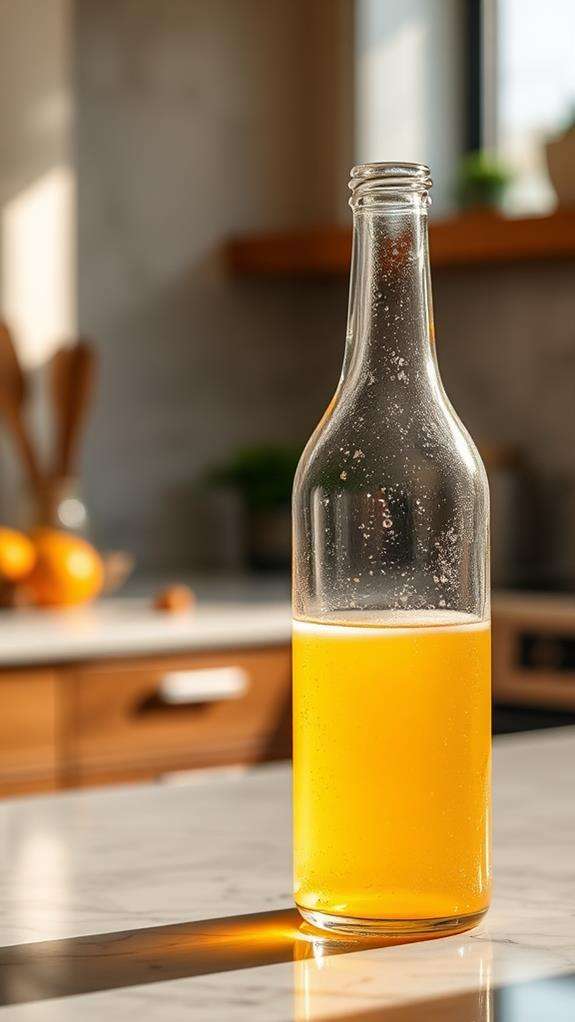
Even with the best refrigeration practices, opened apple juice won't last forever. When you've broken the seal on your apple juice container, you're starting a countdown that typically ranges from 7-10 days for ideal freshness and safety. However, several factors can influence how long your juice remains safe to drink.
The shelf life of your opened apple juice depends on these key factors:
- Initial quality and processing method (pasteurized vs. fresh-pressed)
- Storage temperature consistency in your refrigerator
- Container seal integrity and cleanliness
- Exposure to air and bacteria during pouring
- Presence of natural or artificial preservatives
You'll know your apple juice has gone bad when you notice changes in appearance, smell, or taste. If you see any signs of fermentation, such as bubbling or a slightly alcoholic odor, it's time to discard the juice. The same goes for any visible mold growth, which appears as white, green, or black spots. When in doubt, remember that consuming spoiled juice can lead to food-borne illness, so it's better to err on the side of caution and dispose of juice that's been open longer than 10 days.
Container Types Matter

The container you choose for storing your apple juice greatly impacts its freshness, with glass bottles offering the best protection against light and temperature changes while maintaining the original taste longer. If you're using plastic containers, you'll want to keep them away from direct sunlight and heat sources, as these containers can slightly affect flavor and are more susceptible to temperature fluctuations. Unlike glass or plastic options, juice cartons typically maintain freshness for just 7-10 days after opening, even when properly refrigerated, due to their composite materials and seal designs.
Glass Bottles Stay Fresh
Glass containers consistently outperform other packaging options when it comes to keeping your apple juice fresh after opening. The non-porous, inert nature of glass provides superior protection against contamination and oxidation, which helps maintain your juice's original flavor profile for a longer period.
When you're storing apple juice in glass bottles, you'll notice several distinct advantages:
- Glass doesn't leach chemicals or alter the taste of your juice, unlike some plastic containers
- The airtight seal remains more reliable even after multiple uses
- UV protection (especially in darker glass) helps prevent degradation from light exposure
- Temperature fluctuations affect glass-stored juice less dramatically
- The rigid structure maintains its integrity, preventing microscopic air infiltration
You'll want to guarantee you're keeping your glass-bottled apple juice in the refrigerator at a consistent temperature between 35-40°F (1.6-4.4°C). Even with glass's superior preservation properties, you should consume the juice within 7-10 days of opening. Remember to always check for any signs of spoilage, such as off-odors or unusual coloration, regardless of the container type. While glass bottles might cost more initially, their ability to maintain freshness makes them a smart investment for preserving your apple juice's quality.
Plastic Container Storage Tips
Different plastic containers can greatly impact how long your apple juice stays fresh after opening. You'll find that high-grade PET (polyethylene terephthalate) bottles, commonly used by major brands, offer better protection than generic plastic containers. When storing your juice, you'll want to guarantee the container's seal remains tight and undamaged, as this prevents oxidation and bacterial growth.
For the best results, you should transfer any juice from damaged containers into food-grade storage containers with airtight lids. If you're using the original bottle, check that the plastic hasn't become warped or degraded, which can compromise the juice's freshness. You'll also want to avoid containers that have been used for other substances, as plastic can retain flavors and odors that might affect your juice.
Remember to store the container in the refrigerator at or below 40°F (4°C), and don't leave it in direct sunlight or near heat sources, as this can cause the plastic to leach chemicals into the juice. You should also avoid repeatedly opening and closing the container, as this introduces more air and bacteria into the juice.
Carton Shelf Life Facts
Carton packaging's unique construction greatly affects how long your apple juice stays fresh after opening. The layered material composition of juice cartons, typically combining paperboard, polyethylene, and sometimes aluminum, creates specific storage requirements you'll need to follow for maximum freshness.
When you're storing opened apple juice in its original carton, keep these essential facts in mind:
- Refrigerated cartons typically maintain quality for 7-10 days after opening, assuming consistent temperatures below 40°F
- The carton's oxygen barrier properties begin declining immediately after the seal is broken
- Exposure to light can degrade juice quality faster in translucent cartons compared to opaque ones
- Folding the carton's top properly helps minimize air exposure and prevent contamination
- Temperature fluctuations from frequent opening and closing of your refrigerator can reduce shelf life by 1-2 days
You'll want to check your juice daily for signs of spoilage, even when following proper storage guidelines. The carton's structural integrity may weaken over time as moisture penetrates the paperboard layers, so you should transfer the juice to an airtight container if you notice any carton deterioration.
Preserving Fresh Apple Juice
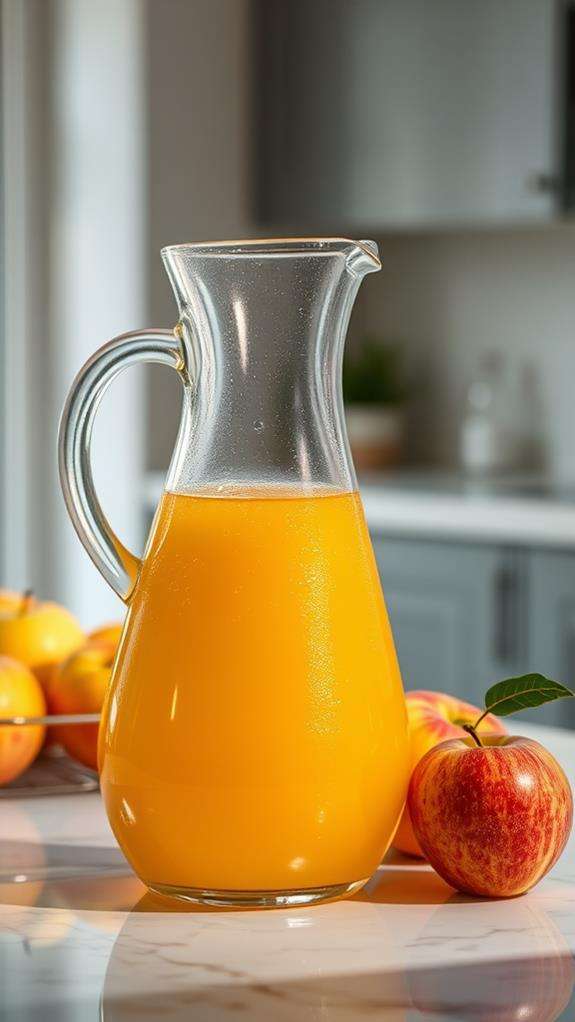
Keeping fresh apple juice at its best requires proper storage techniques and attention to temperature control. You'll want to store your opened juice in an airtight container, preferably in its original container with the cap tightly sealed, to prevent oxidation and maintain freshness.
For ideal preservation, you'll need to keep your apple juice refrigerated at or below 40°F (4°C). Don't leave the juice out at room temperature for more than 2 hours, as this can lead to rapid bacterial growth and fermentation. If you're storing homemade apple juice, you can extend its shelf life by adding a small amount of lemon juice, which acts as a natural preservative due to its citric acid content.
When you're handling the juice, always use clean utensils to prevent contamination, and avoid drinking directly from the container. If you've got more juice than you can consume within 7-10 days, consider freezing portions in freezer-safe containers, leaving about an inch of headspace for expansion. Frozen apple juice can last up to 6 months while maintaining its quality and nutritional value.
Freezing Options
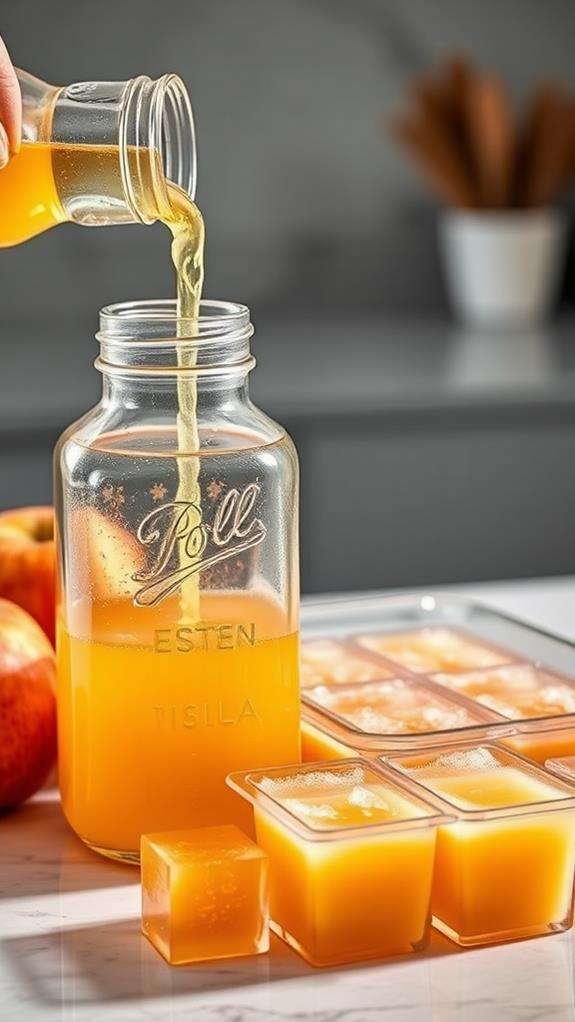
Before freezing your apple juice, you'll want to leave about an inch of headspace in your container to allow for expansion during the freezing process. The best containers for freezing apple juice include freezer-safe plastic bottles, mason jars with straight sides, or dedicated freezer containers that won't crack under temperature changes. For ideal results, you can even portion your juice into ice cube trays first, transfer the frozen cubes to freezer bags, and then use small amounts as needed for recipes or quick defrosting.
Preparing Juice for Freezing
Preserving apple juice through freezing requires proper preparation and suitable containers. Before you freeze your apple juice, you'll need to take several important steps to guarantee the best possible preservation of flavor and quality while preventing container damage during the freezing process.
You'll want to follow these essential preparation steps:
- Pour out approximately 10-15% of the juice from your container to allow for expansion during freezing, as liquids expand when they solidify
- Clean and sanitize your freezer-safe containers thoroughly to prevent bacterial contamination
- Check container seals and lids for any damage that could compromise the juice's preservation
- Label containers with the date of freezing and expected expiration (typically 8-12 months)
- Allow juice to cool completely to refrigeration temperature before transferring to freezer
When selecting containers, opt for food-grade plastic or glass specifically rated for freezer use. If you're using glass containers, guarantee they're tempered and designed for freezing to prevent cracking. You'll also want to leave adequate headspace at the top of each container, as this prevents the expanding juice from causing structural damage during the freezing process.
Best Storage Containers
The right storage containers make all the difference when freezing apple juice for long-term preservation. You'll want to choose freezer-safe containers that provide an airtight seal and allow for expansion, as liquids typically expand by about 10% during freezing.
Glass mason jars with wide mouths work well, but you'll need to leave about 1.5 inches of headspace to prevent cracking. Alternatively, you can use BPA-free plastic containers specifically designed for freezer storage, which offer more flexibility and are less likely to break. If you're planning to store smaller portions, ice cube trays with tight-fitting lids or silicone molds provide convenient serving sizes that you can transfer to freezer bags once frozen.
For bulk storage, consider using heavy-duty freezer bags with double-seal closures. These bags should be freezer-grade and at least 2-mil thick to prevent freezer burn and leakage. When using bags, remove as much air as possible before sealing, and lay them flat in your freezer to maximize space. Always label your containers with the date and contents, using freezer-safe labels or permanent markers that won't fade in cold temperatures.
Food Safety Tips
When handling apple juice, following proper food safety practices helps prevent contamination and foodborne illness. You'll need to be vigilant about cleanliness and proper handling techniques to guarantee your apple juice stays safe to drink throughout its shelf life.
To maintain food safety standards when storing and consuming apple juice, follow these essential guidelines:
- Always wash your hands thoroughly with soap and water before handling the juice or its container
- Check the juice's appearance and smell before each use – if you notice any off-odors, unusual colors, or floating particles, discard immediately
- Never drink directly from the container if you're sharing with others, as this can introduce bacteria
- Keep your refrigerator temperature at or below 40°F (4°C) to inhibit bacterial growth
- Clean the bottle's mouth and cap with a clean, damp cloth before and after each use
Remember to monitor the expiration date and track how long the juice has been open. If you notice any signs of fermentation, such as bubbling or a slightly alcoholic smell, it's time to dispose of the juice. Don't take chances with questionable juice, as consuming spoiled products can lead to food poisoning.
Pasteurized Vs Fresh Storage
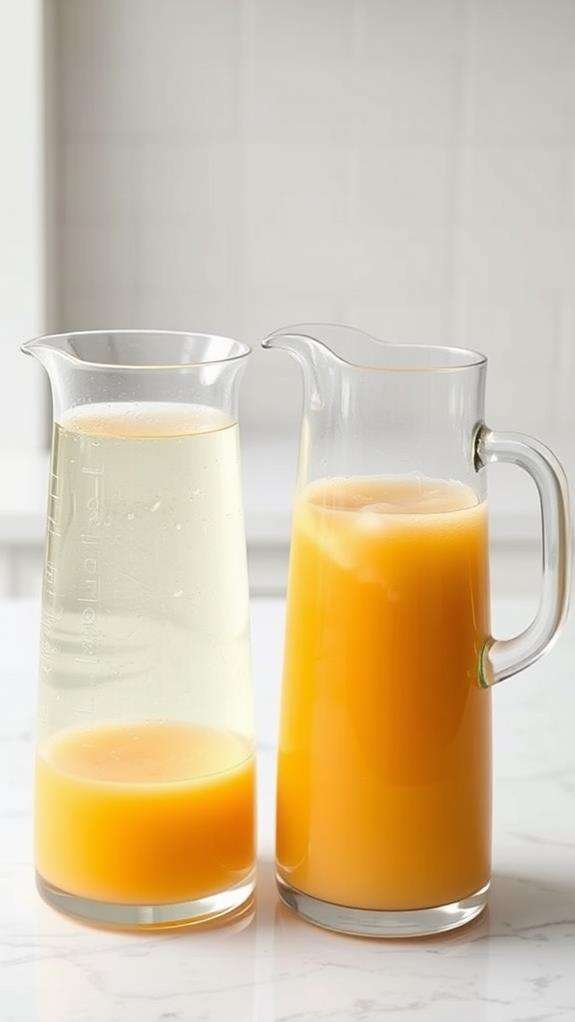
You'll notice significant storage differences between pasteurized and fresh apple juice, with pasteurized varieties lasting 7-10 days in the refrigerator after opening due to the heat treatment that kills harmful bacteria. Fresh-pressed, unpasteurized apple juice has a much shorter shelf life of just 3-5 days in the refrigerator, even with proper storage in an airtight container. While both types should be kept at 40°F (4°C) or below, you'll need to be especially vigilant with fresh juice, watching for signs of fermentation or spoilage like fizzing, off-odors, or changes in color.
Pasteurized Juice Storage Guidelines
Compared to fresh-pressed varieties, pasteurized apple juice offers noticeably longer storage times both before and after opening. The heat treatment process eliminates harmful bacteria and enzymes, extending the juice's shelf life markedly when you follow proper storage guidelines.
For ideal storage of your opened pasteurized apple juice, you'll need to follow these essential guidelines:
- Keep the juice refrigerated at 40°F (4°C) or below at all times
- Store in the original container with the cap tightly sealed
- Use within 7-10 days of opening for best quality
- Place the container toward the back of your refrigerator, where temperatures remain more stable
- Avoid storing near strong-smelling foods, as juice can absorb odors
You'll notice quality changes if you don't follow these guidelines carefully. Signs of spoilage include off-putting odors, unusual coloring, or fizzing that wasn't present when you first opened the container. If you're unsure about your juice's freshness, it's best to err on the side of caution and discard it. While pasteurization extends shelf life noticeably, proper storage remains vital for maintaining both safety and flavor quality.
Fresh Apple Juice Shelf-Life
Storage durations vary dramatically between fresh-pressed and pasteurized apple juice. When you're dealing with fresh-pressed juice, you'll need to consume it much more quickly than its pasteurized counterpart, as it hasn't undergone heat treatment to kill harmful bacteria and microorganisms.
Fresh apple juice typically lasts only 3-5 days in your refrigerator, even when stored properly at 40°F (4°C) or below. You'll want to keep it in an airtight container, preferably glass or food-grade plastic, to maintain its quality and prevent oxidation. If you notice any signs of fermentation, such as fizzing, a sour smell, or unusual taste, don't consume the juice.
For the best quality and safety, you should consume fresh-pressed apple juice within 24 hours of pressing. If you've purchased fresh juice from a local market or juice bar, check the "pressed on" date and follow their specific storage recommendations. Some producers use natural preservatives like vitamin C (ascorbic acid) to extend shelf life slightly, but this won't match the longevity of pasteurized versions. Always trust your senses – if something seems off about your juice's appearance, smell, or taste, it's better to discard it.
Extended Storage Methods
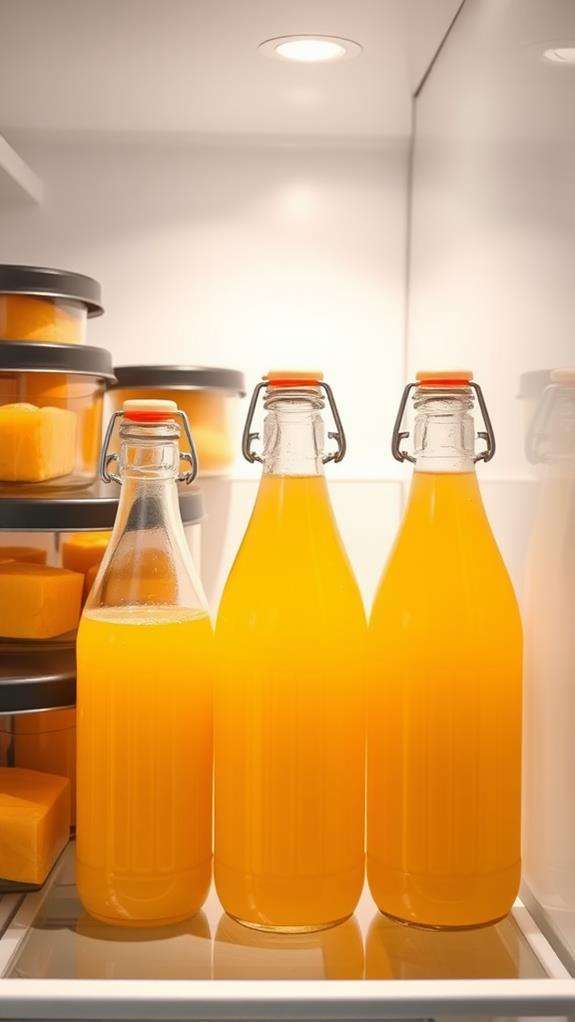
The simplest way to extend your opened apple juice's life is through proper refrigeration and sealing. You'll want to maintain a consistent temperature between 33-40°F (1-4°C) and guarantee the container's lid is tightly secured after each use. Proper storage techniques can help preserve your juice's freshness for up to 7-10 days after opening.
To maximize your apple juice's shelf life, consider these essential preservation methods:
- Transfer the juice to an airtight glass container if the original packaging isn't resealable
- Position the juice toward the back of your refrigerator where temperatures remain most stable
- Use a marker to label the container with the opening date for tracking freshness
- Keep the juice away from strong-smelling foods to prevent flavor absorption
- Consider freezing portions in ice cube trays for longer-term storage up to 6 months
If you're planning to store your juice for an extended period, you can freeze it in its original container, leaving about an inch of headspace for expansion. When you're ready to use frozen apple juice, thaw it in the refrigerator overnight and shake well before consuming to redistribute any settled solids.
Frequently Asked Questions
Can Apple Juice Be Used for Baking After Its Best-By Date?
You're walking on dangerous ground when using expired apple juice in baking! While you can technically use apple juice that's slightly past its best-by date for baking, you'll need to carefully check for signs of spoilage first. If the juice smells fresh, hasn't changed color, and shows no signs of fermentation or mold, you can use it in recipes. However, if you notice any off-putting odors or visual changes, it's best to toss it.
Does Mixing Apple Juice With Other Beverages Affect Its Shelf Life?
When you mix apple juice with other beverages, you'll typically reduce its shelf life to match the quickest-spoiling ingredient in your mixture. If you're combining it with dairy products, your drink will only last 2-3 days refrigerated. Mixing with shelf-stable beverages, like sodas or other fruit juices, won't greatly impact storage time, but you'll still need to follow the standard 7-10 day refrigerated timeline for opened apple juice.
Will Apple Juice Lose Its Nutritional Value Faster if Transferred Between Containers?
As the saying goes, "A container is only as good as its contents." You won't greatly affect your apple juice's nutritional value by transferring it between clean containers. However, you'll want to avoid excessive transfers, as each exposure to air can slightly speed up oxidation. When you do transfer, make sure you're using food-safe containers that seal tightly, and refrigerate promptly to maintain vitamin C levels and freshness.
Can You Drink Apple Juice Left in a Car Overnight?
You shouldn't drink apple juice that's been left in a car overnight. Temperature fluctuations can create an ideal environment for harmful bacteria growth, especially if the juice wasn't refrigerated. If your car's temperature exceeded 40°F (4°C), which is likely during overnight hours, the juice could be unsafe to consume. Even if it looks and smells normal, it's best to discard it rather than risk food poisoning.
Does Organic Apple Juice Spoil Faster Than Conventional Apple Juice?
You might be surprised to learn that both organic and conventional apple juices actually spoil at the same rate once opened, as they share similar sugar content and pH levels. While organic juice doesn't contain artificial preservatives, both types typically last 7-10 days in the refrigerator after opening. The key factor isn't whether it's organic, but rather how you store it – keep it sealed tight and refrigerated below 40°F (4°C) for maximum freshness.
